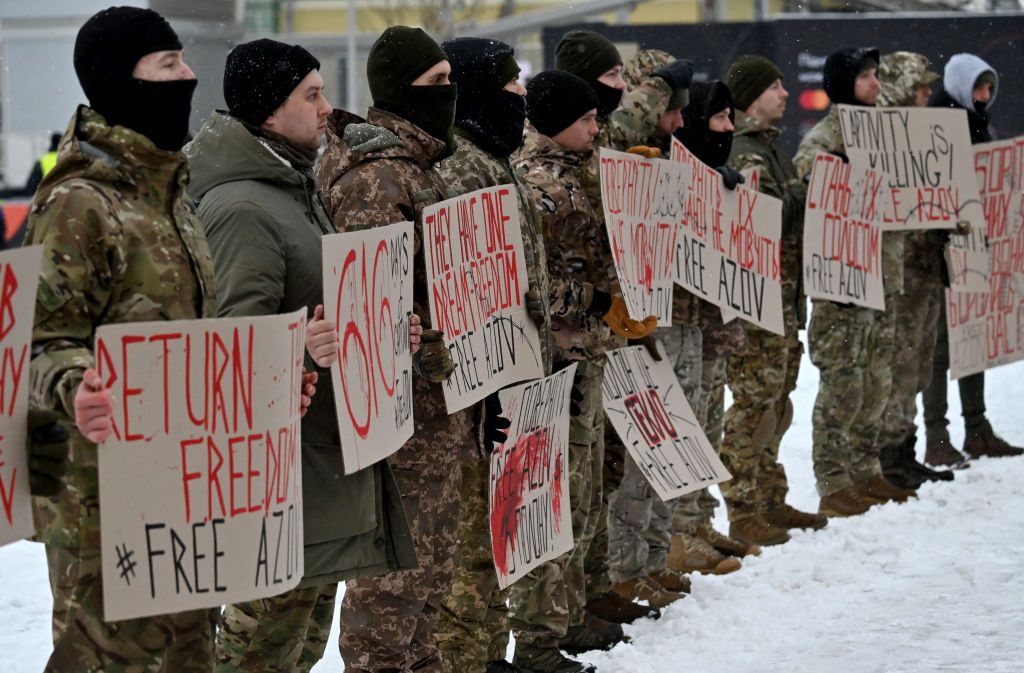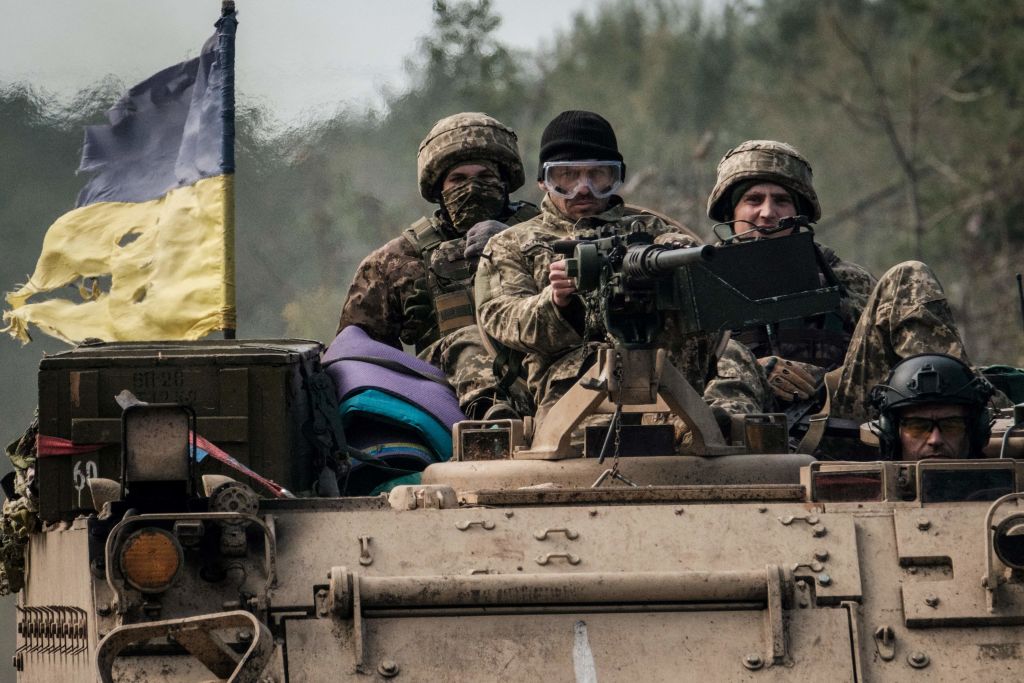Ukraine war latest: Kyiv brings back 95 POWs from Russian captivity

Key developments on July 17:
- 95 Ukrainian POWs released from Russian captivity
- Fighting in Krynky ongoing, but Ukrainian positions 'completely destroyed'
- Citing security concerns, Russian authorities restrict entry to border areas of Belgorod Oblast
- Germany to halve Ukraine military aid, Reuters reports
- Ukraine lists 42,000 citizens as missing persons
- Ukraine reveals final number of men who updated mobilization data
Another 95 Ukrainian defenders have been brought back home, including service members of the Armed Forces, the National Guard, and the Border Guard, President Volodymyr Zelensky announced on July 17.
"Our thanks to our exchange team and the United Arab Emirates (UAE) for mediating their release," Zelensky said, according to his Telegram channel.
"No matter how difficult it may be, we are searching for everyone who may still be in captivity."
The Russian Defense Ministry claimed that the release occurred as part of a prisoner exchange, as 95 Russian captives were also released. Ukraine's Prisoners of War (POW) Coordination Headquarters later confirmed the exchange.
The number of released POWs included 49 service members of the Armed Forces, including one who was voluntarily deployed by helicopter to Azovstal in Mariupol to join the defenders during the Russian siege in 2022.
Twenty-one members of the National Guard, 10 sailors, seven Territorial Defense members, and five border guards were also released, among others.
Bloomberg reported an upcoming UAE-mediated prisoner swap earlier today, adding that this would bring the total number of prisoners exchanged under the Gulf country's mediation to 1,400.
Arab countries like the UAE and Saudi Arabia have repeatedly taken up the role of mediators in prisoner exchanges between Ukraine and Russia.
The previous exchange took place on June 25, when Ukraine brought back 90 prisoners from Russian captivity.
As of July 17, 3,405 Ukrainian captives have been brought safely home since the start of the full-scale invasion, Ombudsman Dmytro Lubinets said on Telegram.
Fighting in Krynky ongoing, but Ukrainian positions 'completely destroyed'
Ukrainian forces are still fighting in Krynky, a key village in the heavily-contested Dnipro bridgehead in Russian-occupied Kherson, but their positions are "completely destroyed," the Defense Forces of Southern Ukraine said on July 17.
The statement comes after unconfirmed reports on July 16 that Ukrainian forces had withdrawn from the village.
"The Defense Forces of Ukraine continue to carry out combat missions on the left bank of the Dnipro, in particular in the area of the settlement of Krynky," the Defense Forces of Southern Ukraine said in a post on Facebook.
"However, it is true that most of the main positions of the Ukrainian troops in the village of Krynky, as a result of intense, combined and prolonged enemy fire, were completely destroyed."
It added that the village itself had been "almost completely destroyed," but Ukrainian forces would "continue to be in designated positions and bridgeheads on the left bank of the Dnipro."
Krynky is a small village in Kherson oblast on the predominantly occupied east bank of Dnipro River. Before the start of the full-scale war, fewer than 1,000 people lived there.
Ukrainian marines first crossed the river and gained a foothold on the Russian-occupied side in October of last year.
Over the next two months, they managed to secure a thin, long bridgehead along the coast.
Marines achieved the most success in Krynky in December, managing to advance around roughly 2.5 kilometers from the river coast.
Fighting for the village has been fierce for months. In February, Ukraine said Russian troops were conducting "human wave" assaults without armored vehicles in an attempt to recapture it.
First-person-view (FPV) drones formed a significant part of Ukraine's firepower against the Russian forces trying to retake the area, and a British Defense Intelligence update on 12 Jan., said 90% of Russian equipment had been destroyed in the sector.
It noted a lack of Russian electronic warfare countermeasures played a large role in this.
But despite this, since taking Krynky Ukrainian forces were unable to advance any further and the operation became controversial, not least among the soldiers taking part.
Speaking to the Kyiv Independent in December, Ukrainian marines highlighted how just crossing the river itself was highly risky and those that made it across were immediately met by Russian mortar fire, glide bombs and artillery.
Some described the operation as a "political decision" to gain a symbolic success on the battlefield despite the human costs involved.
“People are killed to hold on to the ruins,” a 47-year-old Senior Sergeant, Petro, said.
Citing security concerns, Russian authorities restrict entry to border areas of Belgorod Oblast
Authorities in Russia's Belgorod Oblast instituted restrictions on entering 14 towns and villages by the Ukrainian border due to an "extremely difficult operational situation," Governor Vyacheslav Gladkov said on July 16.
Reports of rocket or drone attacks against Belgorod Oblast, which borders Ukraine's Sumy, Kharkiv, and Luhansk oblasts, have become a common occurrence in recent months.
There have also been repeated instances of pro-Ukrainian militia groups, consisting of Russian citizens, conducting cross-border raids into Belgorod Oblast and other border areas.
Gladkov said that enhanced security measures would be instituted in the areas in question, including the suspension of public transport and the creation of military checkpoints.
Only adult men with protective gear, accompanied by soldiers and local officials, will be able to enter, the governor said.
In response to the ongoing attacks and raids at the border, Russian President Vladimir Putin proposed the creation of a "demilitarized" or "sanitary" zone in Ukraine that would put Russian territory and illegally occupied parts of Ukraine out of range of Ukrainian weapons.
The launch of Russia's renewed offensive against Kharkiv Oblast in May 2024 was thought to be part of the goal of establishing such a "sanitary zone."
The offensive was effectively bogged down in just about two weeks, with Ukrainian forces counterattacking near the border town of Vovchansk.
Kremlin spokesperson Dmitry Peskov downplayed both the lack of success in the Kharkiv offensive and the introduction of heightened border security measures on July 17, claiming that the operation to create a "sanitary zone" was still ongoing.
Germany to halve Ukraine military aid, Reuters reports
Germany's military aid for Ukraine will be cut by half next year, according to a draft 2025 budget document reported by Reuters on July 17.
Berlin will provide Kyiv with around 8 billion euros ($8.7 billion) this year but will only give 4 billion euros ($4.35 billion) in 2025.
The move comes amid increasing concern that a Donald Trump victory in the upcoming U.S. presidential election will see a dramatic cut in Washington's support for Ukraine's fight against Russian aggression.
According to Reuters, Berlin is hoping that the shortfall will be made up by the profits from frozen Russian assets.
Last month, G7 leaders eventually came to an agreement on a plan to provide Ukraine with a $50 billion loan by the end of the year, backed by the incurred interest from the $300 billion in frozen Russian assets.
The sum, which Ukraine hopes to receive by the end of the year before a potential return of Trump to the White House, includes a $20-billion pledge by the U.S. and the EU each, Kyodo News reported on July 17.
Japan, Canada, and the U.K. are expected to cover the remaining $10 billion. Ottawa previously said it is ready to shoulder $5 billion of the loan.
The selection of Ohio Senator J. D. Vance as Trump's running mate this week has further raised concerns over the future of U.S. support for Ukraine.
One of the most vocal opponents of U.S. aid to Ukraine, Vance has an extensive back catalog of statements indicating a dramatic shift in White House policy from the current Biden administration.
Ukraine lists 42,000 citizens as missing persons
Ukraine lists 42,000 citizens in its unified register for persons missing under special circumstances, an Interior Ministry official said, Ukrinform reported on July 17.
The register collects data on people who have disappeared due to war, occupation, or natural and man-made disasters.
The figure underscores the humanitarian impact of Russia's full-scale war, which is accompanied by deportations, kidnappings, and a large number of deaths among both the military and civilians in Ukraine.
"Overall, the register has collected information on 51,000 persons missing under special circumstances since its launch" in May 2023, said Dmytro Bohatiuk, the head of the Interior Ministry's missing persons department, adding that 42,000 are listed in the register at the present time.
The latest figure is a considerable growth since April, when Ukraine's Chief Ombudsman, Dmytro Lubinets, revealed that almost 37,000 Ukrainians are considered missing.
The ministry also possesses data on 7,000 people whose whereabouts have already been established, including 3,000 former prisoners of war who are alive and well and 4,000 killed people, mainly soldiers, Bohatiuk said.
Ukraine reports on the number of people in Russia's captivity only sporadically. Authorities said last November that 2,384 soldiers and civilians remained in Russian hands, though several prisoner exchanges have taken place since then.
This number does not include Ukrainian children forcibly deported to Russia, Belarus, or occupied territories, whose numbers exceed 19,500.
Ukraine reveals final number of men who updated mobilization data
From May 18 to July 16, 4,690,496 military-aged men updated their registration data by the July 17 deadline, the country's Defense Ministry has announced.
Ukraine has made steps to update the legal framework around conscription to ramp up mobilization this year. President Volodymyr Zelensky signed a new law on mobilization on April 16.
According to the law, all military-aged men, with some exceptions, had to update their military documents within 60 days from May 18 at public service centers and enlistment offices, or via the online application Rezerv+.
The deadline for updating data expired on July 17, 2024.
"According to the results of the update, 4,690,496 servicemen have performed their duty," Ukraine's defense ministry said in a post on Facebook.
Ukrainians liable for military service who failed to update their data may be fined up to Hr 25,000 (nearly $600) or put on the wanted list.
Fines will not be issued automatically, the General Staff said. According to Ukrainian law, a fine is imposed within three months of the detection of an offense.
If a citizen fails to pay the fine, the case can be transferred to the state enforcement service. The debtor's property or accounts may then be seized, Iryna Harbuz, representative of the Central Legal Department of the General Staff, told Suspilne.
Men who have not updated their data and ignore the summons may be put on the wanted list, Deputy Defense Minister Kateryna Chernohorenko said in an interview with YouTube channel YePytannya.

















